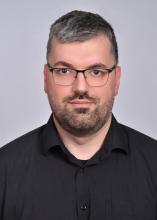AI & Machine Learning
- Artificial Intelligence (AI), Machine Learning, Deep Learning
- Explainable AI (XAI) and Responsible AI
- Generative AI and Foundation Models
23rd International Conference
April 24–26, 2026 · Struga, North Macedonia
The International Conference on Informatics and Information Technologies is the 23rd of the series organized by the Faculty of Computer Science and Engineering (FCSE), UKIM — Ss. Cyril and Methodius University in Skopje.


Submit cutting‑edge work across these focus areas.
Submit your paper and track important dates for CIIT 2026.
*The Microsoft CMT service was used for managing the peer-reviewing process for this conference. This service was provided for free by Microsoft and they bore all expenses, including costs for Azure cloud services as well as for software development and support.
All papers must be original and not simultaneously submitted to another journal or conference. The following paper categories are welcome:
Please use the IEEE Conference proceedings manuscript template. Papers that don’t comply with the rules in the template will not be reviewed and will not be considered for publishing.
Submit Paper to CIIT2026In order to register, please send us an email to ciit@finki.ukim.mk with your Name, Surname, affiliation and payment confirmation.
At least one author per paper has to be registered in order to be able to give the presentation at the conference. Only registered and presented papers will be published in the conference proceedings.
Registered regular participants can publish one additional accepted paper free of charge.
In order to prepare an invoice, we need information about who the invoice should address to (who will pay the invoice). If the payer is an individual, we need the person’s Name, Surname, affiliation, and correspondence address. On the other hand, if the payer is an institution, we need the name of the institution and address data.
We will send you the invoice after receiving the required info.
Note: Citizens of the Republic of North Macedonia might use the following payment details:
We’re finalizing the lineup.
Announced soon
Announced soon
Announced soon
Announced soon
Three days of talks, workshops, and poster sessions.
Hotel Drim — Struga, North Macedonia
Conveniently reachable via Ohrid Airport (OHD) and regional connections. Shuttle details and directions will be posted closer to the event.
We are currently finalizing partnership agreements. Our partners will be announced here soon — stay tuned!
 Тechnical Co-Sponsorship by IEEE N.Macedonia Section
Тechnical Co-Sponsorship by IEEE N.Macedonia Section
We appreciate the support from our community and partners.
CIIT is organized by faculty members from FCSE — Ss. Cyril and Methodius University of Skopje.



(in alphabetical order)
Browse proceedings and archives from past CIIT editions.